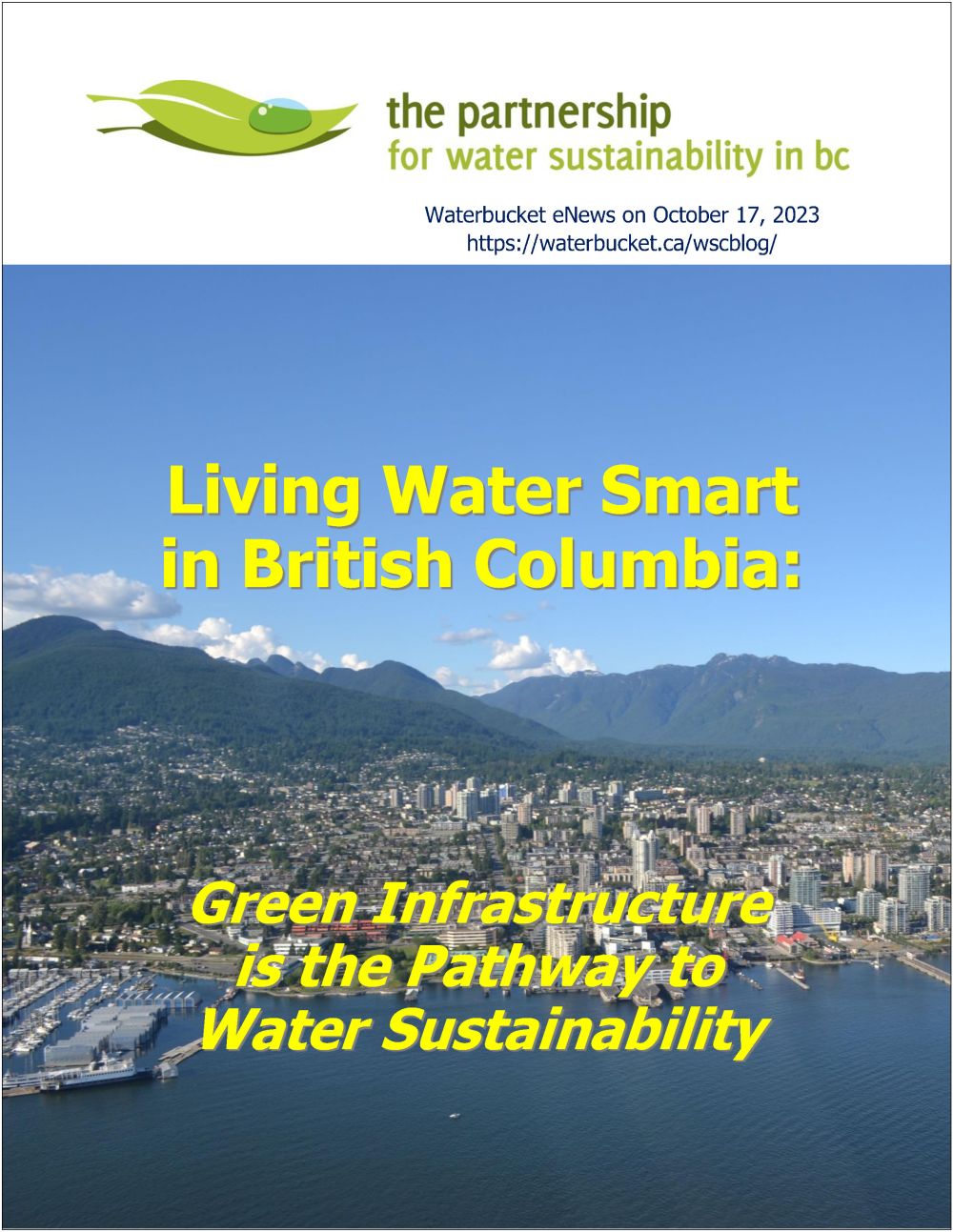DESIGN WITH NATURE TO CREATE LIVEABLE COMMUNITIES AND PROTECT STREAM HEALTH: “We must inspire elected representatives to become champions and do the right thing,” stated Darrell Mussatto, former mayor of North Vancouver City
Note to Reader:
Published by the Partnership for Water Sustainability in British Columbia, Waterbucket eNews celebrates the leadership of individuals and organizations who are guided by the Living Water Smart vision. The edition published on October 17, 2023 featured an interview with Darrell Mussatto, former mayor of North Vancouver City. His time in office coincided with the timeline for the early adopter and leading by example phases of the Metro Vancouver region’s green infrastructure journey. He views the journey through both the regional and local lenses.

Green Infrastructure is the Pathway to Water Sustainability
Darrell Mussatto served on North Vancouver City Council for 25 years from 1993 through 2018, including 13 years as Mayor (2005 to 2018).
His time in office coincides with the timeline for the early adopter and leading by example phases of the Metro Vancouver region’s green infrastructure journey. He views the journey through both the local and regional lenses.
As mayor, Darrell Mussatto was prominent at the regional level. Appointed to the Metro Vancouver Utilities Committee in 2009, for example, he served as chair from 2012 through 2018.
The Utilities Committee provided political oversight for building of regional water supply and sewage treatment facilities. Oversight responsibilities also included the regional strategy for protecting stream systems.

Guided by Darrell Mussatto’s leadership, in the early 2000s the City of North Vancouver embraced a vision for building rain gardens on public and private lands. An enhanced streetscape with rain gardens in “bump outs” became a standard requirement for all re-development projects in the City of North Vancouver.
“The City’s goals are to enhance the city’s streetscapes, restore the health of watercourses, and fulfil regulatory objectives for rainwater management,” he stated in a 2014 interview.
Story of the Metro Vancouver region’s Green Infrastructure Journey (1997-2023)
The past informs the future. It is about looking back to see ahead. In this edition of Waterbucket eNews, we weave a selection of quotable quotes from a conversation with Darrell Mussatto to tell a story.
With the downloadable version of this edition, we include a BONUS FEATURE. It is a preview extract from Create Liveable Communities and Protect Stream Health in the Metro Vancouver Region: Moving Along the Green Infrastructure Continuum. This legacy resource will be published early in 2024.
The bonus is that the complete conversation with Darrell Mussatto is included as an appendix.
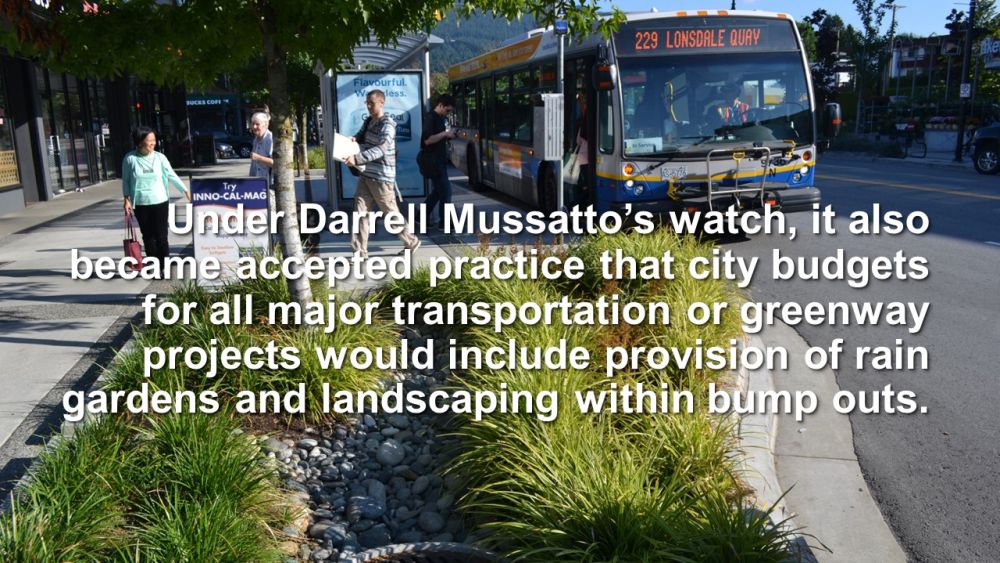
EDITOR’S PERSPECTIVE / CONTEXT FOR BUSY READER
“The past informs the future. To paraphrase what Sir Winton Churchill once famously said, it does help to look back if one wants to see ahead. For many months, this has been my context for conducting conversational interviews in the Metro Vancouver region,” stated Kim Stephens, Waterbucket eNews Editor and Partnership Executive Director.
“In talking to key players in government, both active and retired, I have been trying to understand why we were collectively successful in the 2000s, and what is different now. Looking back, we can clearly see that the 2000s truly was a transformational decade. It offered so much promise and hope.”
“With hindsight, it was fortuitous that after the 2005 local government elections, the Partnership established a mayors and chairs focus group. Thus, we have a written record of the thinking that guided the green infrastructure journey through the 2000s. This means we have a baseline!”

Understand your oral history and frame it to suit the times
“My conversations in 2023 have helped me understand the change in mindset between the “class of 2005” and “class of 2022″. It is a different crowd in 2023. When you look back in order to see ahead, you begin to appreciate the nature of their differences.”
“A lot of things that took place in the 2000s are the building blocks which people have forgotten. As Darrell Mussatto points out in the story behind the story, the loss of understanding is real. In the 2000s, politicians and staff were aligned. This fueled political commitment to take action to achieve a shared vision.”
“A common refrain is that what was possible in the 2000s would not be possible in the 2020s. Times are tough. Those who are in the front lines of local government are embattled, stretched to the limit, and under-appreciated.”
“To find a path forward in these challenging times, you have to understand your oral history and frame it accordingly! Where we have landed on is risk management.”
“We must inspire elected representatives to become champions and do the right thing,” says Darrell Mussatto in his call to action.”
Darrell Mussatto understands the connection between Storm Drains and Stream Health
“Years ago, I prepared a slideshow and met with community groups,” said Darrell Mussatto when he told me his story. “First, I would show photos of catch basins. Do you know where the road runoff goes after it enters the storm drain system? I would ask. Often, there would be a lot of blank looks.”
“Then I would show photos of Wagg Creek. This is where the water goes and look at the consequences. Erosion and channel bank instability. Light bulbs would go on. A common refrain would be: I had no idea, but now I get it’.“
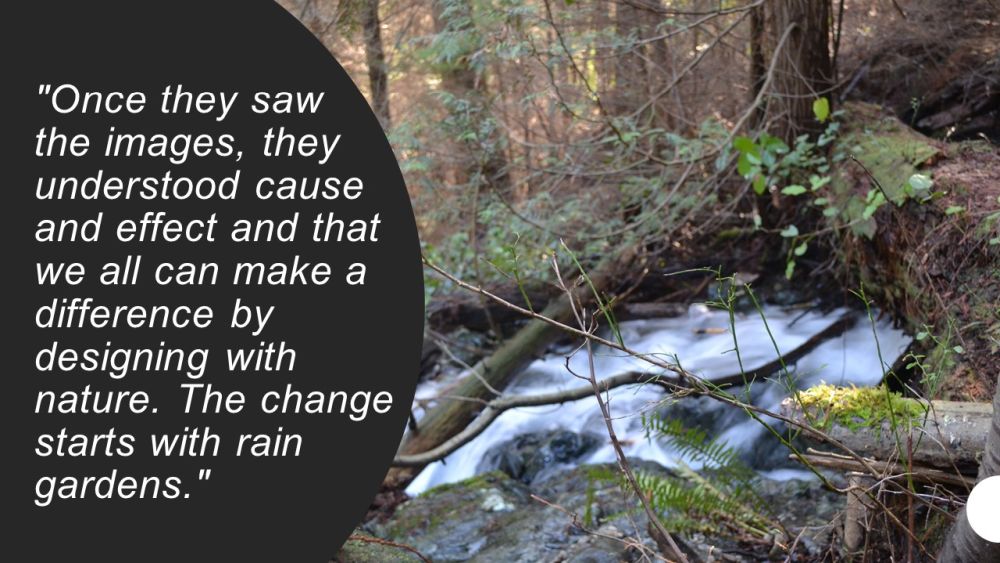
STORY BEHIND THE STORY: Green Infrastructure is the Pathway to Water Sustainability – a conversation with Darrell Mussatto
“You get elected, and you start to learn. And you become inspired by what you see happening. I remember when the Fish Protection Act passed in 1997, and municipalities were required to have setbacks in creeks. This happened in my first term on council and was quite a challenge for us,” recalls Darrell Mussatto.
“This experience was my context when I served on and later chaired the Metro Vancouver Utilities Committee a decade later.”

“The city’s rain garden program is a significant achievement. Before, the prevailing mindset was out of sight, out of mind. We started the program to celebrate rain. We recognized that rain gardens have ecological importance. All those rain gardens add up.”
“Neighbourhoods that were initially doubtful experienced the benefits of softened streetscapes where traffic is slower, and streets feel more liveable. People tell me that they love the rain gardens.”
We must inspire elected representatives to become champions and do the right thing

“After I became chair of the Utilities Committee in 2012, I asked Kim Stephens to meet with the committee twice yearly. The committee had gotten to know and trust Kim when he chaired the advisory LWMP Reference Panel.”
“His presentations were critical in helping us understand what we could do as a committee. We saw green infrastructure as something positive. We could grab onto and run with it.”
The loss of understanding among elected representatives at the regional scale is real
“As an elected representative, you go through the years, and you become more involved. And then in my case, 2018 comes along and you are not running for re-election again. After serving 25 years, you are done! That is a big, big shock. Once you are done, you are done.”
“At the regional level, there has been a recent loss of long-term knowledge and experience. The loss of understanding is real. When politicians retire, staff are still there. They provide the continuity. As an outgoing elected person, you rely on the continuity of key staff to keep it all together.”
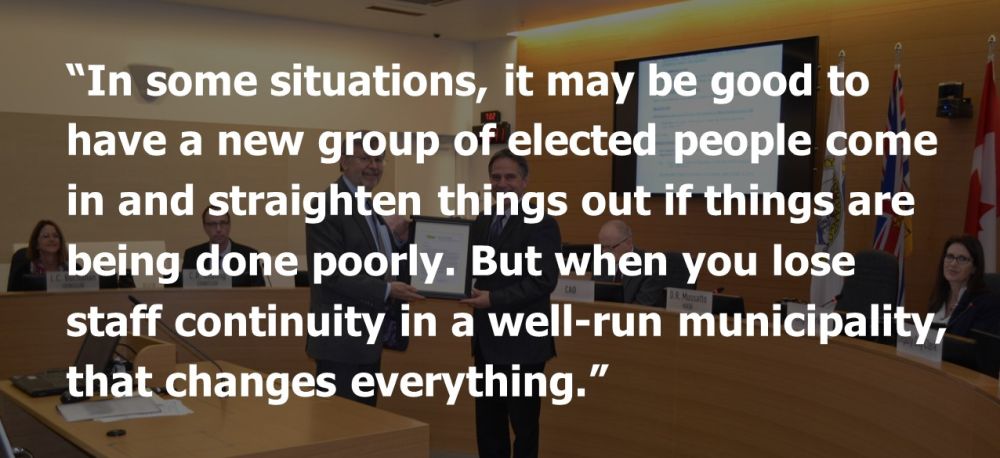
A better way is needed to pass along knowledge to the newly elected
“The loss of continuity in municipal engineering leadership throughout the region concerns me. Just imagine all the knowledge and understanding that must be re-learned. It has come at a critical time for the future direction of the region.”
“Transitioning to a new council is also a challenge, and always has been. We need a better way to pass along the knowledge we gained to the newly elected ones without them feeling like the old crew are still in charge.”
“We had our time in the office. Now it is their turn to carry the baton and be the champions,” concludes Darrell Mussatto.
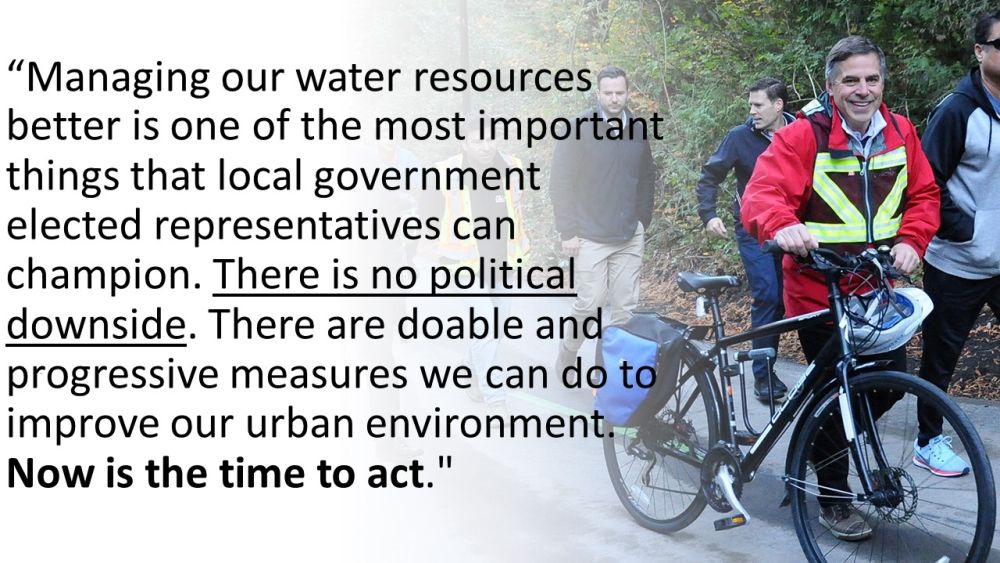
Living Water Smart in British Columbia Series
To download a copy of the foregoing resource as a PDF document for your records and/or sharing, click on Living Water Smart in British Columbia: Green Infrastructure is the Pathway to Water Sustainability. The downloadable version includes a Bonus Feature – the complete interview with Darrell Mussatto!
DOWNLOAD A COPY: https://waterbucket.ca/wcp/wp-content/uploads/sites/6/2023/10/PWSBC_Living-Water-Smart_Darrell-Mussatto-on-green-infrastructure_2023.pdf


